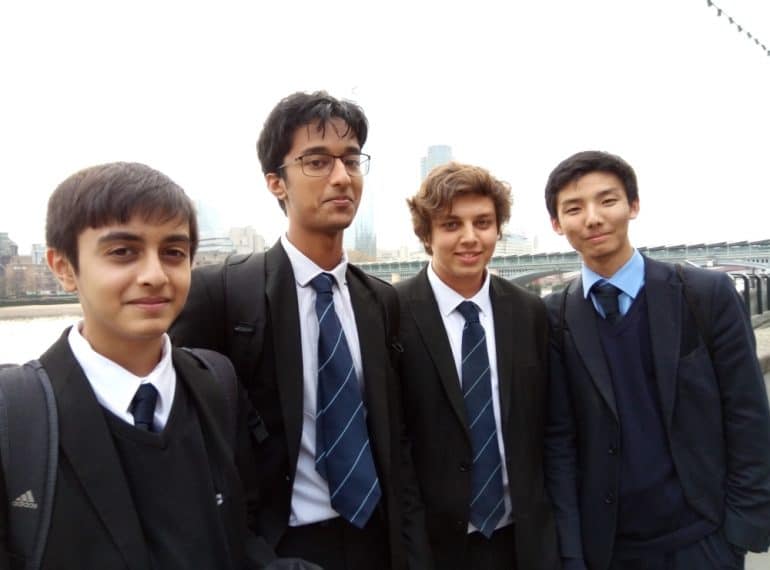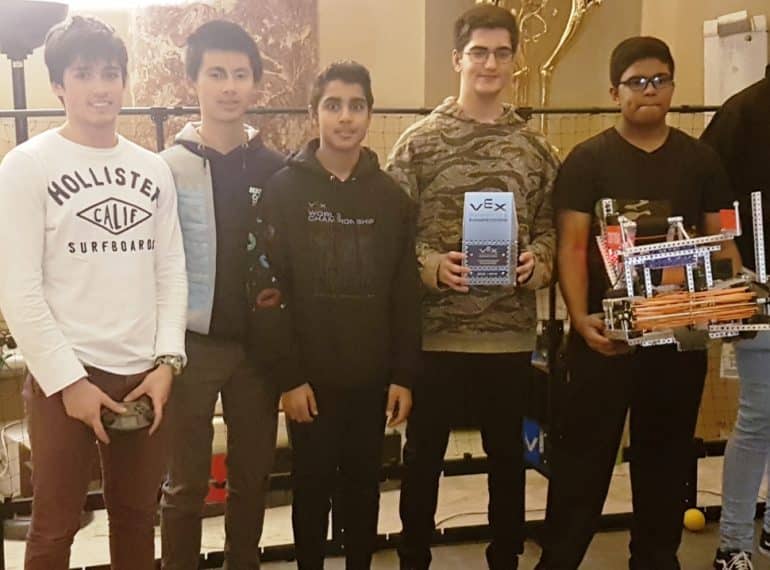
Two senior QE teams have qualified for the national finals of the VEX EDR robotics competition after convincing performances in the regional rounds.
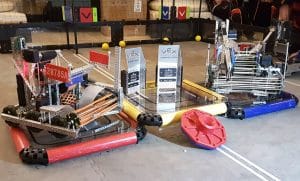 The teams are aiming to build on the School’s success last year, when QE junior boys competing in the parallel VEX IQ competition not only reached the World Championships in the USA but were crowned the UK’s first-ever world champions. A VEX EDR team from QE also qualified for the World Championships, where they achieved the best-ever result for a UK team.
The teams are aiming to build on the School’s success last year, when QE junior boys competing in the parallel VEX IQ competition not only reached the World Championships in the USA but were crowned the UK’s first-ever world champions. A VEX EDR team from QE also qualified for the World Championships, where they achieved the best-ever result for a UK team.
In this year’s competition, Team Hybrid (pictured top), comprising boys from Year 10 and 11, stormed through to the national finals after being crowned Teamwork Champions and losing only one of their nine matches when they competed at Stowe School in Buckinghamshire.
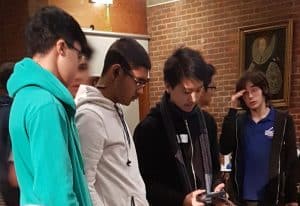 Cobra, a new team comprising Year 12 boys competing in their first-ever VEX EDR event, have also qualified for the nationals, which take place in Telford in March. They performed strongly throughout the round held at St Olave’s Grammar School in Orpington, where they finished third in the Skills Challenge. And in the next round, at The Henrietta Barnett School, they successfully reached both the knockout stage and the final, where they lost by a mere three points.
Cobra, a new team comprising Year 12 boys competing in their first-ever VEX EDR event, have also qualified for the nationals, which take place in Telford in March. They performed strongly throughout the round held at St Olave’s Grammar School in Orpington, where they finished third in the Skills Challenge. And in the next round, at The Henrietta Barnett School, they successfully reached both the knockout stage and the final, where they lost by a mere three points.
A third QE team, Apex, all from Year 10, still holds hope of qualifying for the national finals in the coming weeks. In the tournament at St Olave’s, Apex won the Judges’ Award for the design and construction of their robot and reached the semi-finals, where they 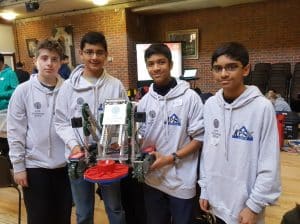 lost out to the team which went on to win the round. Apex also performed strongly at HBS: like Cobra, they reached the knockout stages, where once again they were eliminated by the eventual overall winners.
lost out to the team which went on to win the round. Apex also performed strongly at HBS: like Cobra, they reached the knockout stages, where once again they were eliminated by the eventual overall winners.
The boys were accompanied at the tournaments by Technology teachers Alexander Vaughan and Charlie-Maud Munro. Mr Vaughan said: “My congratulations go to all the boys for their accomplishment. Hybrid and Cobra and are now looking forward to the national finals, with the latter team’s feat in reaching them particularly impressive, given their inexperience in VEX.”
The VEX EDR system has elements designed to fit each other easily, thus enabling seamless integration. The competitions typically feature a series of games in which teams’ robots are given points for accomplishing tasks such as stacking items, scoring goals and parking successfully. Team s are required to collaborate, as well as compete against others.
s are required to collaborate, as well as compete against others.
Several regional events are held, with the qualifying teams then going through to national finals and, ultimately, the World Championship, where the very best from almost 8,500 teams worldwide battle it out. There is a variety of prizes at each level, including awards for design, teamwork and all-round excellence.
This year’s QE VEX EDR teams are:
Team Apex: Swattik Das, Nirmay Jadhav, Ansh Jaiswal, Lucas Lu, Siddh Patel and George Sewell, all of Year 10
Team Cobra: Akram Ahmad, Mahdi Dhirani, Jimmy Ou and Leo Yang, all of Year 12
Team Hybrid: Dillan Shah and Alex Woodcock both of Year 10; Deshraam Ganeshamoorthy, Devin Karia, Daniel Radzik-Rahman and James Tan all of Year 11.

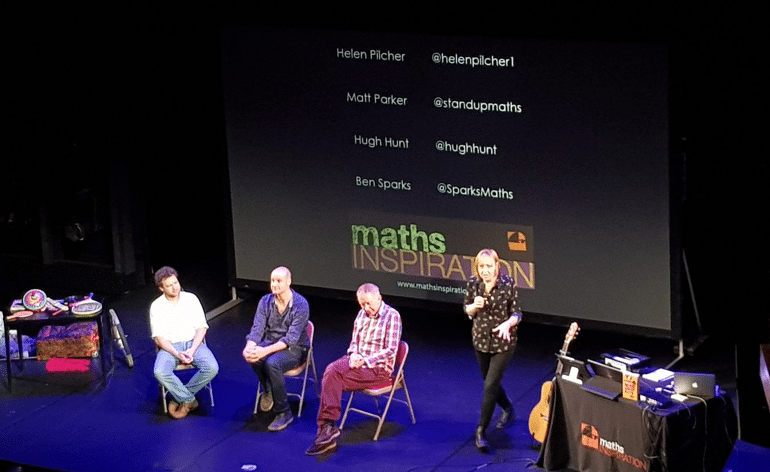
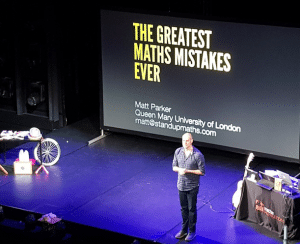 Matt Parker, who describes himself as a “stand-up mathematician”, related some of the mathematical errors set out in his book, Humble Pi. Some, he said, were simply amusing or embarrassing, such as McDonalds miscounting the combinations of meal deals and Pepsi underestimating the value of a fighter plane. However, he pointed out that some other mistakes he had come across could have more serious consequences, such as an aeroplane running out of fuel because the wrong units had been used to fill the tanks.
Matt Parker, who describes himself as a “stand-up mathematician”, related some of the mathematical errors set out in his book, Humble Pi. Some, he said, were simply amusing or embarrassing, such as McDonalds miscounting the combinations of meal deals and Pepsi underestimating the value of a fighter plane. However, he pointed out that some other mistakes he had come across could have more serious consequences, such as an aeroplane running out of fuel because the wrong units had been used to fill the tanks.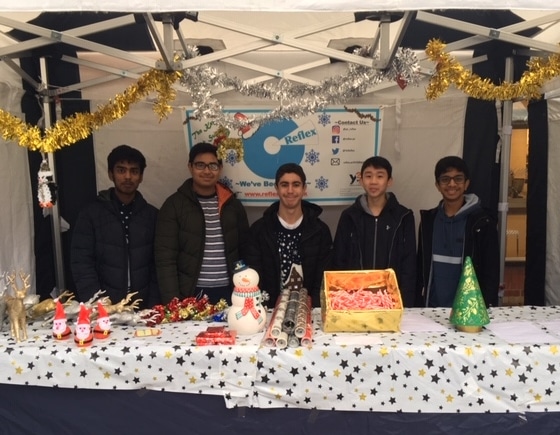
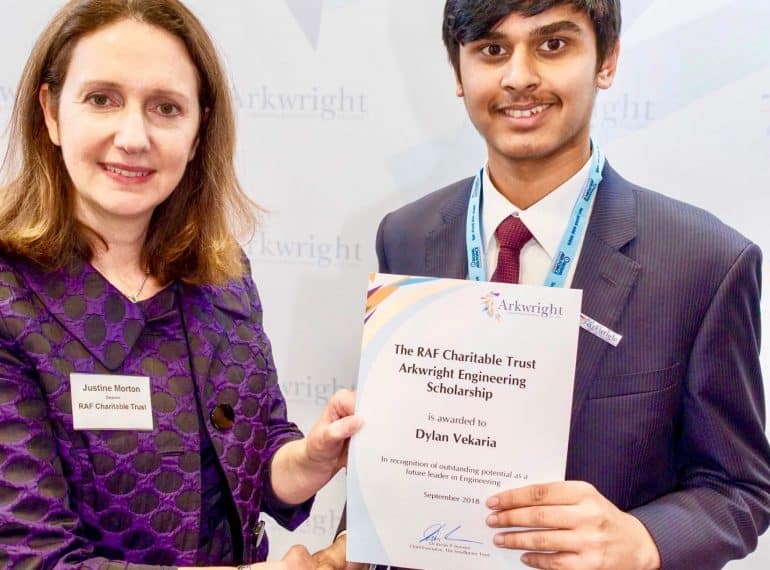
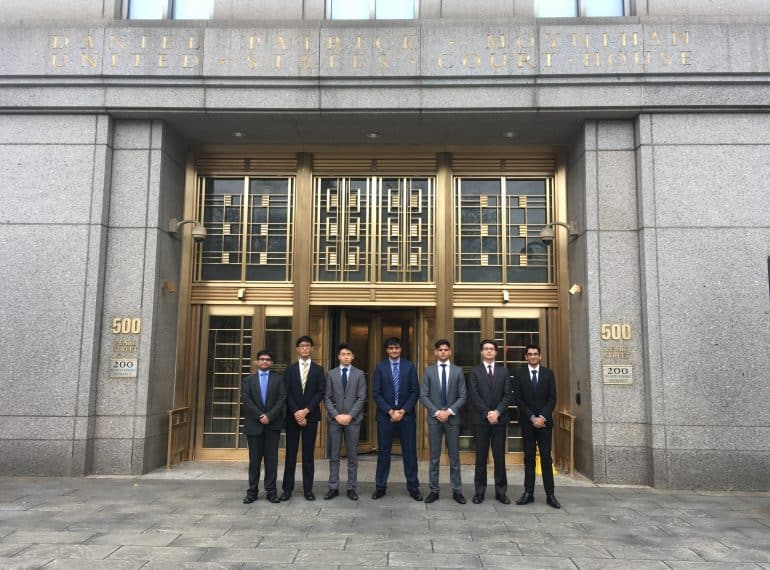
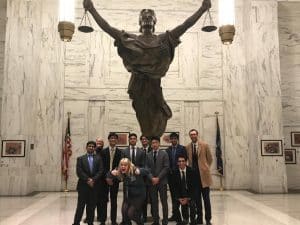 Academic Enrichment Tutor Lucy Riseborough said the competition was a test of both ability and mental stamina. “Whilst similar to the UK version and drawing on similar skills (such as analysing and synthesising information, developing lines of questioning and argument, applying legal principles, learning procedures, effective communication and oracy) the Empire Mock Trial is based on the US courts system. The boys not only had to grapple with case files running to hundreds of pages (witness statements ran to 3,000 words each), but had to learn the different ‘objections’ to utilise (and defend themselves against) in the courtroom. With the ability of attorneys to choose which witnesses are called, the boys had to learn and prepare a lot of information that they would not, in fact, end up using; selecting the right information to deploy, and when, was therefore crucial.
Academic Enrichment Tutor Lucy Riseborough said the competition was a test of both ability and mental stamina. “Whilst similar to the UK version and drawing on similar skills (such as analysing and synthesising information, developing lines of questioning and argument, applying legal principles, learning procedures, effective communication and oracy) the Empire Mock Trial is based on the US courts system. The boys not only had to grapple with case files running to hundreds of pages (witness statements ran to 3,000 words each), but had to learn the different ‘objections’ to utilise (and defend themselves against) in the courtroom. With the ability of attorneys to choose which witnesses are called, the boys had to learn and prepare a lot of information that they would not, in fact, end up using; selecting the right information to deploy, and when, was therefore crucial.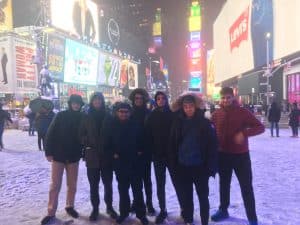 During their trip, the QE boys took the opportunity to do some sight-seeing, notwithstanding the freezing temperatures and the snow that heralded their arrival. After dinner on the first evening, they went to Times Square, whilst the following morning they walked around Central Park in the snow. On the last day they went up the Empire State building to take in the view and also visited Grand Central Station.
During their trip, the QE boys took the opportunity to do some sight-seeing, notwithstanding the freezing temperatures and the snow that heralded their arrival. After dinner on the first evening, they went to Times Square, whilst the following morning they walked around Central Park in the snow. On the last day they went up the Empire State building to take in the view and also visited Grand Central Station.